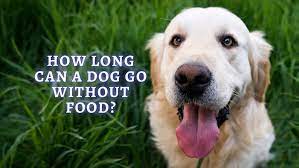Dog’s Hunger: How Long Can They Go Without Eating?
As responsible pet owners, one of our primary concerns is ensuring the well-being of our furry companions. When it comes to our canine friends, their eating habits are a significant part of their overall health. Have you ever wondered how long a dog can go without eating? In this comprehensive guide, we will explore the factors affecting a dog’s appetite and delve into the typical duration a dog can go without eating.
Factors Affecting a Dog’s Appetite
Just like humans, dogs’ appetites can vary depending on several factors. Understanding these factors can help you gauge how long your dog can go without eating:

how long can a dog go without eating
Age and Life Stage
A dog’s age plays a crucial role in its eating habits. Puppies are typically more energetic and may require more frequent meals. Older dogs, on the other hand, may have a decreased appetite due to age-related changes.
Health and Medical Conditions
A dog’s health can significantly impact its appetite. Illnesses, dental issues, and gastrointestinal problems can lead to decreased food intake. Certain medications may also affect a dog’s hunger.
Temperament and Stress Levels
A dog’s temperament and stress levels can influence its appetite. Changes in the environment, separation anxiety, or traumatic experiences can lead to a temporary loss of appetite.
Typical Duration a Dog Can Go Without Eating
Exploring the Canine Fasting Period
Dogs are known for their hearty appetites, but there may be occasions when your furry friend appears to be less interested in food. Understanding the typical duration a dog can go without eating is essential for pet owners.
The Canine Hunger Strike
It’s important to recognize that dogs have a unique way of regulating their food intake. Unlike humans, they are opportunistic eaters, which means they may skip a meal or two without concern. In some cases, dogs might even go on a brief hunger strike.
Short-Term Fasting
Under normal circumstances, a healthy dog can go without eating for a short duration. This can range from 24 to 48 hours without any adverse effects on their health. It’s crucial to monitor your dog during this time, ensuring they have access to water to prevent dehydration.
The Role of Water
While dogs can tolerate short-term fasting, it’s essential to provide them with fresh water at all times. Dehydration can be more concerning than a brief period of not eating. Ensure that your dog remains well-hydrated even if they’re not showing interest in their food.
Signs Your Dog Might Be Going Too Long Without Eating
Key Symptoms of Appetite Loss
While it’s normal for dogs to have brief periods of reduced appetite, some signs indicate your dog might be experiencing an extended hunger strike. Being attuned to these symptoms is crucial for your pet’s health:
Weight Loss
A noticeable drop in your dog’s weight can be a sign that they’ve been without food for an extended period. Regular weigh-ins can help you track any significant changes.
Lethargy and Weakness
A lack of energy or enthusiasm can be a result of prolonged fasting. If your dog seems unusually tired or weak, it’s time to investigate.
Vomiting and Diarrhea
Digestive issues like vomiting and diarrhea can occur when a dog’s digestive system is inactive for an extended period. These symptoms can lead to dehydration.
Changes in Behavior
Pay attention to any changes in your dog’s behavior. Anxiety, irritability, or disinterest in activities they once enjoyed can indicate discomfort.
Persistent Refusal to Eat
If your dog consistently refuses food for more than 48 hours, it’s a sign that something may be amiss. Consult with a veterinarian if this occurs.
Health Implications of Prolonged Appetite Loss
Understanding the Risks of Starvation
Prolonged appetite loss in dogs can have serious health implications. It’s essential to be aware of the risks associated with starvation and the potential consequences for your furry companion:
Malnutrition
When a dog doesn’t consume enough essential nutrients for an extended period, malnutrition can occur. This can lead to deficiencies in vitamins and minerals, affecting overall health.
Muscle Wasting
A lack of nutrition can result in muscle wasting, causing a dog to become weaker and less active. This can further exacerbate the problem.
Organ Dysfunction
The body’s organs, including the liver and kidneys, require a consistent supply of nutrients to function properly. Starvation can lead to organ dysfunction and, in severe cases, organ failure.
Weakened Immune System
A poorly nourished dog is more susceptible to infections and illnesses due to a weakened immune system. Their ability to fight off diseases diminishes.
Mental and Emotional Distress
Extended periods of hunger can lead to mental and emotional distress in dogs, affecting their overall well-being and quality of life.
How to Encourage Your Dog to Eat
Tips and Tricks for Stimulating Appetite
If your dog is experiencing a loss of appetite, there are several strategies you can employ to encourage them to eat and ensure they receive the nutrition they need:
Offer Palatable Meals
Try offering your dog highly palatable and aromatic meals. Warm food slightly to enhance its aroma and make it more enticing.
Hand-Feeding
Hand-feeding can create a positive bonding experience and make mealtime more appealing. Offer small, frequent meals throughout the day.
Add Flavor Boosters
Consider adding small amounts of low-sodium broth or a bit of cooked lean meat to your dog’s food to enhance its flavor.
Change Feeding Environment
Changing the location or type of feeding dish can sometimes pique your dog’s interest. Experiment with different bowls and settings.
Limit Treats and Snacks
Reduce the number of treats and snacks your dog receives between meals to ensure they are hungry during mealtimes.
Consult Your Veterinarian
If your dog’s appetite loss persists, consult your veterinarian. They can rule out underlying medical conditions and guide suitable dietary changes or supplements.
Seeking Professional Help
When It’s Time to Consult a Veterinarian
While home-based strategies can be effective in many cases, there may come a point when it’s necessary to seek professional help for your dog’s appetite issues. Here are some situations in which consulting a veterinarian is advisable:
Prolonged Appetite Loss
If your dog continues to refuse food for an extended period, especially beyond 48 hours, it’s crucial to consult a veterinarian. Prolonged appetite loss can indicate an underlying health problem that requires attention.
Rapid Weight Loss
Significant and rapid weight loss in your dog is a cause for concern. It may be a sign of malnutrition or an underlying medical condition that needs to be addressed.
Vomiting or Diarrhea
Persistent vomiting or diarrhea can lead to dehydration and worsen appetite loss. If your dog experiences these symptoms along with reduced food intake, consult a veterinarian promptly.
Behavioral Changes
Sudden behavioral changes, such as increased irritability, restlessness, or disinterest in usual activities, can signal physical discomfort. A vet can investigate the root cause.
Underlying Health Conditions
If your dog has pre-existing health conditions or is taking medications, appetite loss may be linked to these factors. A veterinarian can adjust treatment or recommend a suitable diet.
Age-Related Appetite Changes
Older dogs may experience age-related changes in appetite. Consulting a vet can help determine if these changes are typical or if there’s an underlying issue.
FAQs to dogs’ appetite and eating habits:
1. How long can a dog go without eating?
Answer: Generally, a healthy dog can go without eating for 24 to 48 hours without adverse effects, but it’s essential to monitor them and ensure they have access to water.
2. What are common reasons for a dog’s loss of appetite?
Answer: Several factors, including illness, stress, dental issues, medications, and changes in routine, can contribute to a dog’s loss of appetite.
3. When should I be concerned about my dog’s reduced appetite?
Answer: You should be concerned if your dog consistently refuses food for more than 48 hours, and exhibits signs of weight loss, vomiting, diarrhea, or changes in behavior.
4. Can I hand-feed my dog to stimulate their appetite?
Answer: Yes, hand-feeding can be a helpful strategy to encourage eating and create a positive bonding experience with your dog.
5. Should I change my dog’s food if they’re not eating?
Answer: Changing your dog’s food abruptly can further reduce their appetite. Consult your vet for advice before making dietary changes.
6. What role does water play in a dog’s appetite?
Answer: Water is crucial to prevent dehydration during periods of reduced food intake. Ensure your dog has access to fresh water at all times.
7. How can I make my dog’s meals more appealing?
Answer: You can try warming their food slightly, adding flavor boosters like low-sodium broth or lean meat, and using different feeding dishes or locations.
8. Are there specific foods that can stimulate a dog’s appetite?
Answer: Some dogs may be enticed by foods like boiled chicken, rice, or canned dog food. However, it’s essential to maintain a balanced diet.
9. Is it normal for older dogs to have reduced appetites?
Answer: Yes, age-related appetite changes are common in older dogs. Consult your vet to adjust your diet accordingly.
10. When should I consult a veterinarian for my dog’s appetite issues?
Answer:* You should consult a vet if your dog‘s appetite loss persists, they experience rapid weight loss, vomiting, diarrhea, or significant behavioral changes, or if their reduced appetite continues beyond 48 hours.
Conclusion
When it comes to your furry friend’s appetite, proactive care and timely intervention are crucial. Understanding how long a dog can go without eating, recognizing signs of prolonged appetite loss, and seeking professional assistance when necessary are all fundamental aspects of responsible pet ownership.




